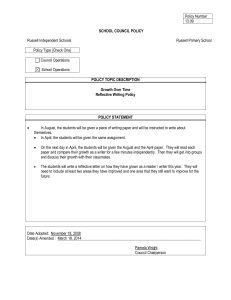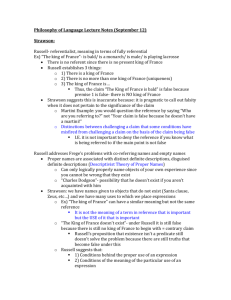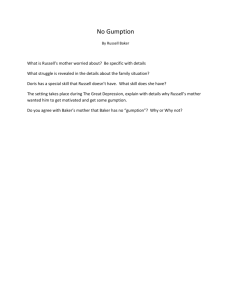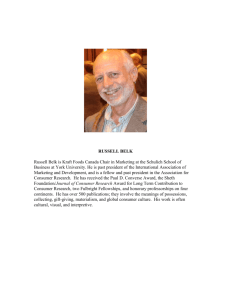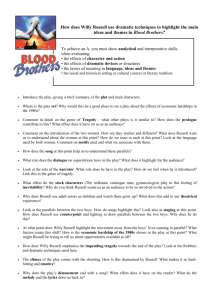Petition for certiorari
advertisement
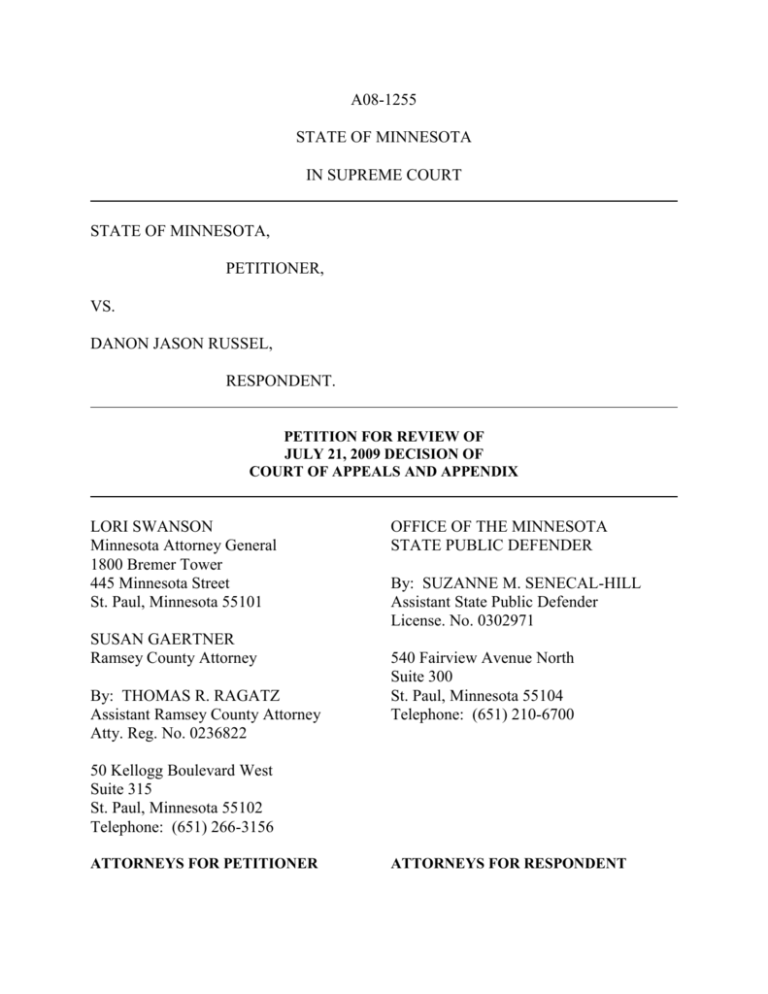
A08-1255 STATE OF MINNESOTA IN SUPREME COURT STATE OF MINNESOTA, PETITIONER, VS. DANON JASON RUSSEL, RESPONDENT. PETITION FOR REVIEW OF JULY 21, 2009 DECISION OF COURT OF APPEALS AND APPENDIX LORI SWANSON Minnesota Attorney General 1800 Bremer Tower 445 Minnesota Street St. Paul, Minnesota 55101 SUSAN GAERTNER Ramsey County Attorney By: THOMAS R. RAGATZ Assistant Ramsey County Attorney Atty. Reg. No. 0236822 OFFICE OF THE MINNESOTA STATE PUBLIC DEFENDER By: SUZANNE M. SENECAL-HILL Assistant State Public Defender License. No. 0302971 540 Fairview Avenue North Suite 300 St. Paul, Minnesota 55104 Telephone: (651) 210-6700 50 Kellogg Boulevard West Suite 315 St. Paul, Minnesota 55102 Telephone: (651) 266-3156 ATTORNEYS FOR PETITIONER ATTORNEYS FOR RESPONDENT TO: The Supreme Court of the State of Minnesota. Petitioner State of Minnesota respectfully requests that this Court grant review of the decision of the Court of Appeals, Halbrooks, Willis, JJ., and Toussaint, CJ. LEGAL ISSUE The police stopped defendant/respondent Russell and learned his identity. Police later obtained a search warrant for Russell’s DNA, which matched the predominant DNA profile found on the gun that Russell was ultimately convicted of possessing. Is knowledge of Russell’s identity suppressible? The trial court did not rule on this issue; the court of appeal held that Russell’s statement of identification should have been suppressed. STATEMENT OF THE CASE On October 2, 2007, defendant/respondent Danon J. Russell was charged with possession of a firearm by an ineligible person. At a contested omnibus hearing on January 14, 2008, presided over by the Honorable James H. Clark, Jr., Russell argued that the police illegally stopped him and that the search warrant for his DNA (which was ultimately identified on the firearm) was not supported by probable cause. Judge Clark filed an order denying Russell’s motion to suppress on February 20, 2008. A jury trial, March 3 through March 8, 2008, resulted in Russell being found guilty, and sentenced by Judge Clark to the mandatory minimum 60-month term. On direct appeal, the court of appeals reversed. It held that the police stop of Russell was unlawful, and rejected the state’s argument that knowledge of identity cannot be suppressed. State v. Russell, 2009 WL 2151098 (Minn. Ct. App. July 21, 2009); Petitioner’s Appendix (“App.”) 1-5. 1 STATEMENT OF FACTS 853 York Avenue East is a “problem property.” The resident, M.P., is known to police as a copper thief. During the year and a half he had lived there, police visits had resulted in the recovery of approximately five stolen vehicles and approximately ten arrests for outstanding warrants, auto theft, and drug-related crimes. Police knew that many people coming and going at the house were self-admitted methamphetamine users. When patrolling on August 4, 2006, officers Robert Buth and Trygve Sand saw at the house three people they did not recognize, who immediately and hurriedly went into the house when the officers arrived. One of those men was Russell. Officer Buth thought this behavior was suspicious. The officers talked with M.P. to try to find out who the men were. M.P. did not know one of the men at all, and identified the others as “Morrison” and “D.” “D” is Russell’s nickname. The officers then saw the previously unidentified man, Benjamin Danielski, leave the house, go to his car, and retrieve a small container. They stopped him and discovered that the container was a “meth kit” containing drugs and paraphernalia. Danielski was arrested and his car was searched and towed. A black duffel bag, with a .38 revolver inside, was found in the trunk. When Danielski was found with the “meth kit,” Officer Buth noticed Russell standing towards the front of the house and stopped him to get his name. Russell said his name was Treyvon and that his birthday was July 15, 1982. He also said his age was 22. Officer Buth thought the name “Treyvon” did not make sense with the nickname “D,” and noticed the age Russell gave was incorrect for the birth date. Because he believed 2 Russell was giving a fake name, he handcuffed him and began walking him down the street toward the squad car. Russell then said “[o]kay, okay, I have warrants.” Officer Buth confirmed that there was a felony warrant for Russell’s arrest. Police later interviewed Danielski, who stated he had seen Russell with a .38 revolver the week before. Danielski admitted to briefly holding the gun, which he was prohibited from doing. He said that on August 4, 2006, he picked up Russell and gave him the keys to put something in Danielski’s car. Danielski did not know what Russell put in the car. Police applied for a search warrant to obtain Russell’s DNA to test against DNA samples from the gun. The Honorable William H. Leary, III found probable cause and issued the search warrant. Tests showed that Russell’s DNA profile was the dominant profile on the gun. REASONS FOR GRANTING REVIEW This case involves an issue of first impression in Minnesota, on which the federal circuits and other states are split. The majority of federal circuits reject the court of appeals’ erroneous conclusion that knowledge of identity is subject to suppression. This question is an important one, likely to repeat, on which this Court should rule. The court of appeals held: the stop here was illegal, but for the stop the officers would not have learned Russell’s identity, and without knowledge of his identity the officers could not have obtained a search warrant for his DNA, so the evidence of 3 Russell’s DNA should be suppressed. The validity of the stop is irrelevant, however, because knowledge of identity cannot be suppressed. 1 The key point in this case is that the officers’ stop of Russell did not yield any evidence, it just resulted in the officers learning appellant’s identity. The state has never attempted to use against Russell any physical evidence obtained at the time of the stop, the content of any statements he made, his fingerprints, or any other evidence. The probable cause portion of the search warrant that yielded Russell’s DNA does not contain any evidence obtained from the stop.2 The stop simply provided the police with knowledge of appellant’s identity. In I.N.S. v. Lopez-Mendoza, the United States Supreme Court stated that “[t]he ‘body’ or identity of a defendant or respondent in a criminal or civil proceeding is never itself suppressible as a fruit of an unlawful arrest, even if it is conceded that an unlawful arrest, search, or interrogation occurred.” added). 468 U.S. 632, 1039-40 (1984) (emphasis Lopez-Mendoza had challenged the court’s jurisdiction to bring him to a deportation hearing after he was illegally stopped. Id. at 1035-36. Courts have interpreted this holding differently in determining when identity-related evidence can be suppressed. 1 The state is not seeking review of the validity of the stop here, which just involves the application of well-established law to unique facts. If this Court grants review and reverses the court of appeals, it would be appropriate to remand for determination of whether the search warrant application established probable cause, an issue the court of appeals did not reach. 2009 WL 2151098 at *5. 2 The court of appeals erred in concluding that Russell’s name was necessary for issuance of the search warrant. 2009 WL 2151098 at *5; App. 5; see, Minn. Stat. § 626.08 (“A search warrant cannot be issued but upon probable cause, support by affidavit, naming or describing the person . . ..”) (emphasis added). 4 A majority of the federal circuit courts of appeals – seven – have either held that Lopez-Mendoza means what it says – that the identity of a defendant in a criminal case is never itself suppressible – or that knowledge of identity is otherwise not subject to the exclusionary rule.3 In support of suppression, Russell and the court of appeals cited cases from the 8th and 10th Circuits, and the District of South Dakota. In none of these cases, however, did the court suppress knowledge of identity, as opposed to evidence of identity, such as fingerprints, or statements and documents related to identity. See United States v. Olivarez-Rangel, 458 F.3d 1104 (10th Cir. 2006) (discussing suppression of statements, fingerprints, and I.N.S. file); United States v. Rodriguez-Arreola, 270 F.3d 611 (8th Cir. 2001) (discussing suppression of identity evidence in dicta; evidence included a state I.D. card, fingerprints, and statements about identity); United States v. Guevera-Martinez, 262 F.3d 751 (8th Cir. 2001) (discussing fingerprints); United States v. Mendoza-Carrillo, 107 F.Supp.2d 1098, 1106-07 (D.S.D. 2000) (discussing suppression of statements and fingerprints; court specifically held that officers could identify the defendant without revealing his statements). 3 See United States v. Farias-Gonzales, 556 F.3d 1181 (11th Cir. 2009); United States v. Bowley, 435 F.3d 426 (3rd Cir. 2006); United States v. Navarro-Diaz, 420 F.3d 581 (6th Cir. 2005); United States v. Del Toro Gudino, 376 F.3d 997 (9th Cir. 2004), cert. denied, 543 U.S. 1170 (2005); Navarro-Chalan v. Ashcroft, 359 F.3d 19 (1st Cir. 2004); United States v. Roque-Villanueva, 175 F.3d 345 (5th Cir. 1999); United States v. Adegbite, 846 F.2d 834 (2nd Cir. 1988); see also, e.g., People v. Cobb, 703 N.Y.S.2d 341 (NY. Crim. Ct. 1997); People v. Panfili, 145 Cal. App. 3d 387 (Cal. Ct. App. 1983). 5 Further, none of these cases involves a defendant who had an outstanding arrest warrant, as here. Numerous courts have held that the existence of such a warrant dissipates any taint from an illegal initial detention; these arrest-warrant cases illustrate the principle that knowledge of identity is not subject to suppression.4 It is clear that Fourth Amendment violations cannot serve to shield someone from prosecution, simply because identity was discovered during the course of the stop. See United States v. Crews, 445 U.S. 463, 474 (1980) (holding that illegal arrest is not a bar to prosecution, and that a person is not himself evidence that can be suppressed). The most logical reading of Lopes-Mendoza and Crews is that knowledge of identity is not suppressible. See, e.g., United States v. Farias-Gonzales, 556 F.3d 1181, 1189 (11th Cir. 2009); United States v. Navarro-Diaz, 420 F.3d 581, 585-88 (6th Cir. 2005).5 In Farias-Gonzales, a case relied on by the court of appeals in reversing Judge Clark, the Eleventh Circuit explained that: [A]llowing a criminal defendant to use the exclusionary rule to exclude evidence of his identity achieves the same result as would allowing him to suppress the court's jurisdiction over him. While Farias-Gonzalez does not seek to prevent the court from summoning him before it, he does seek to prevent the Government from showing who he is when he appears before it. 4 See, e.g., United States v. Green, 111 F.3d 515 (7th Cir.), cert. denied, 522 U.S. 973 (1997); State v. Walker-Stokes, 903 N.E.2d 1277 (Ohio Ct. App. 2008); People v. Reese, 761 N.W.2d 405 (Mich. Ct. App. 2008); McBath v. State, 108 P.3d 241 (Alaska Ct. App. 2005); People v. Murray, 728 N.E.2d 512 (Ill. Ct. App. 2000); State v. Hill, 725 So.2d 1282 (La. 1998); Ruffin v. State, 412 S.E.2d 850 (Ga. Ct. App. 1991); Reed v. State, 809 S.W.2d 940 (Tx. Crim. App. 1991); State v. Lamaster, 652 S.W.2d 885 (Mo. Ct. App. 1983); People v. Hillyard, 589 P.2d 939 (Colo. 1979); State v. Rothenberger, 440 P.2d 184 (Wash. 1968). 5 These last two cases are particularly helpful in explaining the consensus that identity cannot be suppressed, and the reasons for this rule; copies are attached in petitioner’s appendix. 6 If Farias-Gonzalez can suppress the Government's evidence of who he is, then he has accomplished the same thing he would have accomplished had he suppressed the ability of the court to exercise jurisdiction over him. 556 F.3d at 1188. Similarly, preventing the state from putting Russell’s name on a search warrant, or from arresting him on a pre-existing warrant and thereby confirming his identity, effectively suppresses jurisdiction over him.6 The constitutional question presented here is not only an important one, it is also one that is likely to recur, as evidenced by the number of cases across the country dealing with it – especially in situations where an illegal stop leads to discovery of an arrest warrant. Indeed, this question may reoccur for Russell himself. If this Court denies review, and Russell is released, can the state obtain a new search warrant, without his name but with his description, and serve it on him as he is being discharged from the department of corrections? Or, as he is being discharged, can he be picked up on the felony arrest warrant that Officer Buth discovered in 2006, or any other still-valid arrest warrants? Or, to dissipate taint, do the police have to give him a head start when he walks out of prison, and if so, how much of a head start? See, e.g., United States v. Green, 111 F.3d 515, 521 (7th Cir. 1997) (“It would be startling to suggest that because 6 Russell may argue that exclusion is necessary to deter violations of the Fourth Amendment. The Eleventh Circuit has persuasively rebutted such an argument: “[C]ivil suits provide deterrence for searches and seizures that violate the Fourth Amendment. Since identity-related evidence is collectible without implicating the Fourth Amendment, Fourth Amendment violations will only occur when there is an unconstitutional search or seizure prior to the collection of the identity-related evidence. Thus, officers seeking to obtain identity-related evidence will gain nothing by violating a suspect’s constitutional rights . . ..” Farias-Gonzales, 556 F.3d at 1189. Further, the suppression of any physical evidence obtained in an illegal search will continue to deter police officers from violating the Fourth Amendment, even if this Court holds that knowledge of identity cannot be suppressed. 7 the police illegally stopped an automobile, they cannot arrest an occupant who is found to be wanted on a warrant – in a sense requiring an official call of ‘Olly, Olly, Oxen Free.’”). CONCLUSION The state respectfully requests that this Court grant this petition for review. Respectfully submitted, SUSAN GAERTNER RAMSEY COUNTY ATTORNEY Dated: August 19, 2009 By: Thomas R. Ragatz Assistant Ramsey County Attorney ATTORNEYS FOR PETITIONER 8

